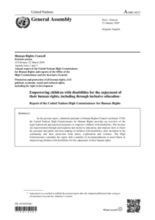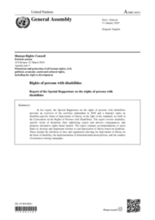Displaying 511 - 520 of 1482
This article examines the aftercare experiences of young people who have recently left a residential care institution in Lagos State, Nigeria.
In the present report, submitted pursuant to Human Rights Council resolution 37/20, the United Nations High Commissioner for Human Rights provides an overview of the legal framework and practical measures to empower children with disabilities.
This study used magnetic resonance imaging to compare adolescent AIDS orphans reared in institutions with a sex- and age-matched group of healthy adolescents reared in families in China using a voxel-based morphometry analysis.
The present article proposes a first-stage mental health screening procedure (calibrated for high sensitivity) for children and adolescents (ages 4–17) in alternative care, which children’s agencies can implement without clinical oversight using the Strengths and Difficulties Questionnaire (SDQ) and Brief Assessment Checklists (BAC).
In her report, the Special Rapporteur on the rights of persons with disabilities provides an overview of the activities undertaken in 2018 and a thematic study on disability-specific forms of deprivation of liberty, in the light of the standards set forth in the Convention on the Rights of Persons with Disabilities.
In this paper, the authors advance a framework for examining the nature and consequences of neglect, which they posit can be represented as variations along a continuum from severe psychosocial neglect to environmental enrichment.
Guided by social-ecological theory, this study explores responses to violence against children with disabilities, including preventative measures and treatment of victims in the West African countries of Guinea, Niger, Sierra Leone, and Togo.
This study examined the impact of the model of professional childcare in a three-year project involving fifty-three children and young people and their carers in local-authority children’s homes on two UK areas (Northern and Southern England).
This study compared adolescents in residential care (RC) in Portugal, with a Portuguese community sample on the incidence of mental health problems and psychosocial skills, explored gender differences and the relationships between mental health problems and psychosocial competencies.
The main objective of this study is to explore, from a bottom-up perspective, the moderating effect of an experienced happiness indicator (OHS) and the daily-life activities shared between caregivers and adolescents in the residential care system in Peru.



